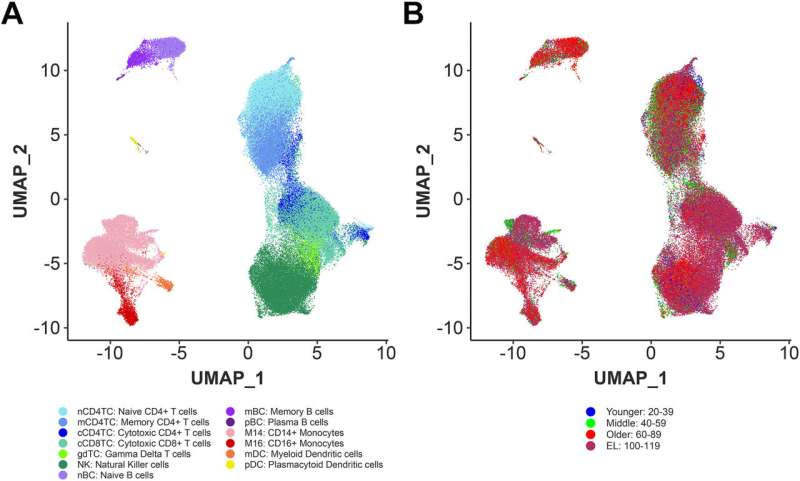This article has been reviewed according to Science X's editorial process and policies. Editors have highlighted the following attributes while ensuring the content's credibility:
fact-checked
peer-reviewed publication
trusted source
proofread
Study finds centenarians possess unique immunity that helps them achieve exceptional longevity

There are approximately 30 trillion cells in a human body and our health is predicated on them properly interacting with and supporting each other, with the immune system playing a particularly pivotal role. One of the defining characteristics of aging is a decline in the proper functioning of our immune system. Centenarians, a rare population of individuals who reach 100 years or more, experience delays in aging-related diseases and mortality which suggests their immune systems remain functional into extreme old age.
Led by researchers from Boston University Chobanian & Avedisian School of Medicine and Tufts Medical Center, a new study finds centenarians harbor distinct immune cell type composition and activity and possess highly functional immune systems that have successfully adapted to a history of sickness allowing for exceptional longevity. These immune cells may help identify important mechanisms to recover from disease and promote longevity.
"Our data support the hypothesis that centenarians have protective factors that enable to recover from disease and reach extreme old ages," said lead author Tanya Karagiannis, Ph.D., senior bioinformatician, Center for Quantitative Methods and Data Science, Institute for Clinical Research and Health Policy Studies at Tufts Medical Center.
"We assembled and analyzed what is, to our knowledge, the largest single-cell dataset of centenarian subjects that allowed us to define unique features of this population that support the identification of molecular and lifestyle factors contributing to their longevity," explained senior author Stefano Monti, Ph.D., associate professor of medicine at the School of Medicine.
To identify immune-specific patterns of aging and extreme human longevity, the researchers performed single cell sequencing on peripheral blood mononuclear cells (PBMCs)—a broad category of immune cells circulating in the blood—taken from seven centenarians enrolled in the New England Centenarian Study, one of the largest studies of long-lived individuals in North America led by Thomas Perls, MD, at the School of Medicine.
They then integrated this dataset with two publicly available single‐cell RNA sequencing (scRNA-seq) datasets of PBMCs to investigate compositional and transcriptional changes in circulating immune profiles across the human lifespan and extreme old age.
Lastly, they applied advanced computational techniques to analyze the combined data, to evaluate how the cell type composition (the proportion of different cell types) and activity change as a function of age, and whether centenarians manifest profiles capturing or escaping the expected age progression.
Their analysis confirms observations made in previous studies of aging and identifies novel cell type-specific compositional and transcriptional changes that are unique to centenarians and reflect normal immune response.
According to the researchers, when people are exposed to infections and recover from them, their immune system learns to adapt, but this ability to respond declines as we age.
"The immune profiles that we observed in the centenarians confirms a long history of exposure to infections and capacity to recover from them and provide support to the hypothesis that centenarians are enriched for protective factors that increase their ability to recover from infections," said senior author Paola Sebastiani, Ph.D., director, Center for Quantitative Methods and Data Science, Institute for Clinical Research and Health Policy Studies at Tufts Medical Center.
The researchers believe these findings provide a foundation to investigate mechanisms of immune resilience likely contributing to extreme longevity as a target for healthy aging therapeutics. "Centenarians, and their exceptional longevity, provide a 'blueprint' for how we might live more productive, healthful lives. We hope to continue to learn everything we can about resilience against disease and the extension of one's health span," said senior author George J. Murphy, Ph.D., associate professor of medicine at the School of Medicine.
These findings appear online in eBiomedicine.
More information: Tanya T. Karagiannis et al, Multi-modal profiling of peripheral blood cells across the human lifespan reveals distinct immune cell signatures of aging and longevity, eBioMedicine (2023). DOI: 10.1016/j.ebiom.2023.104514


















